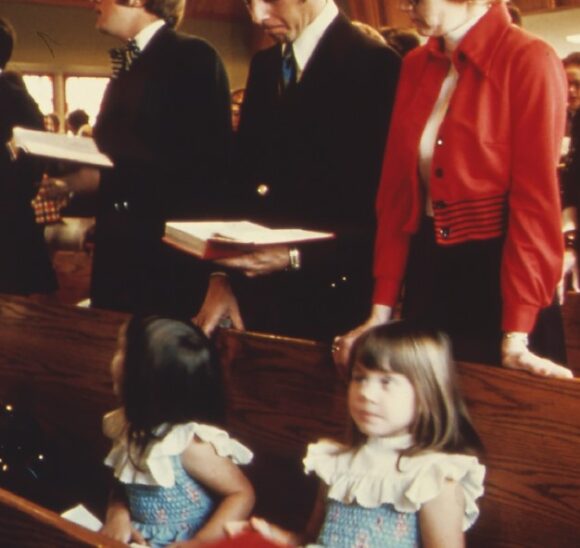“I DON’T THINK MUCH of your church,” said Sam. “You all look miserable and the service is boring. Why can’t you be like the church near me where everyone is happy?”
It is outrageous if inappropriate attitudes put people off true Christianity. Most certainly it is true that some people do show more emotion than others, and some congregations are very sombre. While some of us are naturally down-beat, it may be the (often un-knowable) reasons for our moods that matter.
Contentment with Circumstances
One reason for being miserable is a general dissatisfaction with our lives, leading to habits of grumbling and complaining. If this is the mind-set of the believer, then they are effectively finding fault with God, Who gives us everything we have. This is a serious matter: the complaints of the Hebrews in the wilderness prevented them from entering the Promised Land (Numbers 14:29). In contrast, the Apostle Paul said that he had learnt to be ‘content’, despite all his problems—many of which were even a consequence of his faith.
Not that I am speaking of being in need, for I have learned in whatever situation I am to be content. I know how to be brought low, and I know how to abound. In any and every circumstance, I have learned the secret of facing plenty and hunger, abundance and need (Philippians 4:11–12; see also 1 Timothy 6:6).
In fact, apostles rejoiced that they were worthy to suffer for Jesus (Acts 5:41) and sang hymns in prison (Acts 16:25).
Happiness is Not Enough
However, the fact that we may be enjoying our worship and looking happy does not, in itself, make it pleasing to God, nor does it mean that our faith is biblical. When Moses was away in Mount Sinai the Hebrews in the wilderness made a golden calf and worshipped it. The occasion was extremely enjoyable—the people were making a loud noise and dancing. However, God was displeased with them and about three thousand died as a consequence (Exodus 32).
The Law of Moses instructed the Jews how to worship God, and some of the feasts it prescribed were intended to be very joyful (for example the Feast of Tabernacles, see Leviticus 23:40). On other occasions (for example on the Day of Atonement, Leviticus 16:29–31), the people were commanded to ‘afflict themselves’, with very good reason: they were to be reminded of the seriousness of sin and their need for God’s mercy. Consequently many of the feasts must have evoked mixed feelings. Killing their pet lamb would not be joyful, but the feast of Passover was designed to remind the people of their deliverance from slavery in Egypt and also to point forward to Jesus Christ, the Lamb of God whose sacrifice can deliver us from death (Exodus 12:18–27).
A Time for Everything
So the wise man says that there is a time for everything: ‘a time to weep, and a time to laugh; a time to mourn, and a time to dance’ (Ecclesiastes 3:4).
But he also comments on mirth:
A good name is better than precious ointment, and the day of death than the day of birth. It is better to go to the house of mourning than to go to the house of feasting, for this is the end of all mankind, and the living will lay it to heart. Sorrow is better than laughter, for by sadness of face the heart is made glad. The heart of the wise is in the house of mourning, but the heart of fools is in the house of mirth (Ecclesiastes 7:1–4).
This is an insightful reflection on human nature: a godly attitude is more likely when we are considering our mortality than when we are ‘without a care in the world’. So being subdued, or even sad, can be spiritually beneficial.
Jesus said, ‘Blessed are those who mourn, for they shall be comforted’ (Matthew 5:4).
This needs some thought! The word for ‘mourn’ in the original Greek is a strong one, indicating the sort of grief one has when bereaved of a loved one. So what should the Christian believer mourn? Most certainly they should not indulge in self-pity, as the Christian focus should be God and His kingdom (Matthew 6:33, Colossians 3:2). However, while Jesus is away and sin and its consequences prevail there is much to be sad about.
And Jesus said to them, “Can the wedding guests mourn as long as the bridegroom is with them? The days will come when the bridegroom is taken away from them, and then they will fast” (Matthew 9:15).
Jesus said that such mourners would be ‘blessed’, which indicates happiness, and seems inherently contradictory. How can you be truly happy when you are sad? The answer lies in the nature of the happiness: it is a joy which underpins every experience and problem in life—a bedrock that is solid and unmoveable despite all the upheaval and stress going on above it. So the true believer’s faith and utter trust in God mean that he or she is fundamentally unshakeable, with a composure that is far better than any temporary happiness evoked by pleasures in this life. This is exemplified in the words of the prophet:
Though the fig tree should not blossom, nor fruit be on the vines, the produce of the olive fail and the fields yield no food, the flock be cut off from the fold and there be no herd in the stalls, yet I will rejoice in the Lord; I will take joy in the God of my salvation (Habakkuk 3:17–18).
These are remarkable words because the lack of crops in Israel would have been a punishment for the nation’s unfaithfulness (Deuteronomy 28:20–24).
Jesus himself was not always happy. He is described as ‘a man of sorrows, and acquainted with grief’ (Isaiah 53:3), and he wept over Jerusalem’s lack of faith ( Luke19:41–42) . The prophets were grieved at the faithlessness of the people (Jeremiah 9:1–3) and we know that wickedness makes God sad (Genesis 6:6).
Christians can be desperately sorry for their continuing sinfulness and total unworthiness before the one righteous God. A number of the Psalms give insights into the intense remorseful feelings of a sinner (especially Psalms 38 and 51), but also the blessings of forgiveness (Psalm 32). Moreover, believers may—like Lot, the godly man living in the wicked city of Sodom—be ‘greatly distressed by the sensual conduct of the wicked’ (2 Peter 2:7).
But their sorrow should always be ‘godly’ and hence productive.
For godly grief produces a repentance that leads to salvation without regret, whereas worldly grief produces death (2 Corinthians 7:10).
The Right Attitude
One of the shortest verses in the Bible is 1 Thessalonians 5:16: ‘Rejoice always.’ Indeed the Apostle Paul encourages believers to ‘rejoice in our sufferings’, knowing that these can develop virtuous characteristics pleasing to God (Romans 5:3–4). In the preceding verses he talks about ‘peace with God’ and rejoicing ‘in hope of the glory of God’ (Romans 5:1–2). Later in the chapter he makes it clear that this peace is due to being reconciled to God (Romans 5:10). We will not necessarily have total peace of mind, as we grapple with our human nature about which we can never be complacent (Romans 7:21–25).
So Sam did have a valid point—not every service is a funeral! People who have been reconciled to God have a responsibility to have a positive attitude, to be thankful and to praise God, even though there cannot be total joy until Jesus returns. If Christ’s followers project a miserable image, what does that say about their faith? And their attitude should be motivated by the teaching in the Bible, rather than only by emotional responses.
Anna Hart




